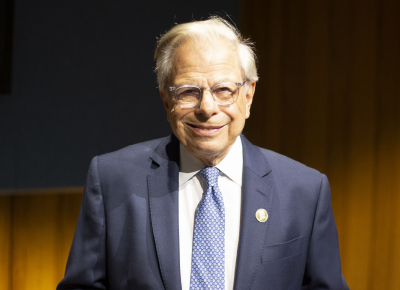DR. SAMUEL WAXMAN
The Fight To Eradicate Cancer
Since 1976, the Samuel Waxman Cancer Research Foundation, an international non-profit organization dedicated to curing and preventing cancer, has allocated more than $100 million to support the work of an estimated 200 researchers worldwide. Founded by Samuel Waxman, M.D., a notable oncologist and physician-scientist at the Icahn School of Medicine at Mount Sinai, the Foundation is a pioneer in cancer research. Its mission is to eradicate cancer.
The SWCRF’s innovative approach funds cutting-edge research that identifies and corrects abnormal gene function that causes cancer, as well as the development of minimally toxic treatments for patients. Investigators share information and tools to accelerate cancer research through the Foundation’s collaborative group of world-class scientists, the Institute Without WallsTM (IWW).

Funding for these projects is generated through various events, including the tremendously successful Hamptons Happening, which made its return this past summer. Also, their annual Ladies Luncheon, and of course its biggest fundraiser of the year, the 24th Annual Collaborating for A Cure Gala, aptly themed Together Again since last year’s event was reimagined as a virtual event due to the global pandemic. The upcoming gala will honor Debra S. Waller, Chairman and CEO of Jockey International, Inc., and Dr. Kevan Shokat. The gala will also feature a live performance by Jason Isbell and The 400 Unit with extraordinary guest artist Warren Haynes.
DISCOVERING NEW TREATMENTS
Dr. Shokat, an SWCRF-funded investigator, recently discovered a new compound that effectively shuts off the most common cancer-causing genetic mutations—the overactive KRAS protein, which is most common in lung cancer as well as colorectal and pancreatic cancer. This mutant protein was considered “undruggable” for decades. Still, after 15 years of research and significant investments from SWCRF, a new FDA-approved medication is now available that shrinks tumors by 50 percent and has remarkably low toxicity.
“This medication is a real gamechanger,” said Waxman. “This is a perfect example of why we do what we do—fund leading scientists, encourage collaboration, and find new treatments for cancer that will save lives.
Dr. Waxman’s passion for cancer research and treatment stems from the belief that collaboration—across expertise, research institutions, and even national borders—is the key to breaking down barriers and achieving more breakthroughs. They fund a network of 50 researchers, including some of the brightest scientific minds in North America, Asia, and Europe, through the SWCRF IWW. For example, SWCRF supported numerous collaborations at academic research institutions in China, the lead of which resulted in the discovery of a treatment for a type of leukemia that increased patient survival rates from less than 25 percent to greater than 95 percent.
AGING & CANCER
Over the last several years, the SWCRF initiated a renewed focus on aging and cancer. In 2018, SWCRF launched a new partnership with the National Cancer Institute and National Institute on Aging. The initial two-year, $3 million collaboration will bring together some of the brightest minds working on addressing the rising incidence of cancer in older populations. SWCRF also partnered with Wiley Publishing in 2019 to produce a new scientific peer-reviewed journal titled Aging AND Cancer, focused on understanding how the process of aging is linked to cancer.
FIGHTING FEMALE CANCER
The Foundation is also committed to funding breakthrough research towards better patient outcomes for those living with breast and ovarian cancer. Approximately 12.9 percent of women will be diagnosed with breast cancer, and 1.2 percent will be diagnosed with ovarian cancer at some point during their lifetime, according to data from the National Cancer Institute. In the past ten years, SWCRF has allocated $4 million to its Women’s Cancer Research Program and is currently investing $1,550,000 towards 15 prestigious scientists working on finding new treatments for breast and ovarian cancer.
For more information on the Samuel Waxman Cancer Research Foundation, visit: waxmancancer.org





